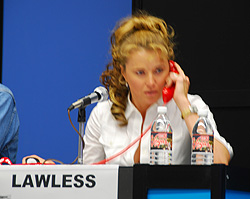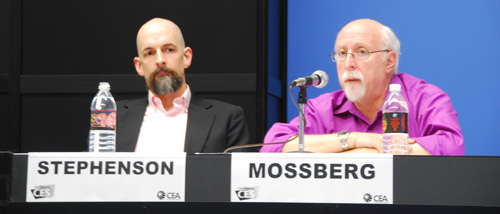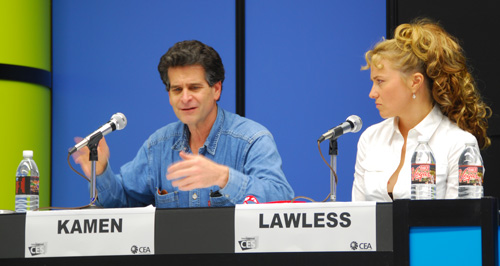
By Evan Ackerman
There are a bunch of celebrities here at CES, but I’m ignoring most of them, since all they’re good for is stealing my valuable gadget sniffing time on the show floor. I say most, because (besides Bill), I am devoting an hour to one conference session more or less solely because of the celebrity panel, which includes Lucy Lawless (Xena, and Cylon Number Three on Battlestar Galactica), Neal Stephenson (author of Snow Crash), Walt Mossberg (tech columnist for the Wall Street Journal), and Dean Kamen (inventor of the Segway, among many other things). I’ll be liveblogging this in the same way that I did the keynote.
[ UPDATE- Video of the entire thing (an hour long) up at DVICE here ]
Lots of text, and a picture or two, after the jump.
Okay, there they are. Lucy Lawless is (as you’d expect if you’ve seen any recent episodes of Battlestar Galactica) totally hot. Gadzooks. Oh, by the way, this panel is being sponsored by the SciFi Channel and DVICE.com.

First question for Lucy: “What’s your greatest influence in scifi?” Answer: “Doctor Who!” Same question for Neal: He’s read all the classics, but Heinlein has been his greatest influence, along with popular science magazines “back when they were good.” Mossberg throws in with Neal, with the additions of Asimov (specifically the Foundation trilogy), as well as Star Trek TNG (as opposed to TOS). “Star Trek tried to use science fiction as a way to deal with human social, political, moral issues.” Now, of course, he’s addicted to Battlestar, which is the only thing he watches on the SciFi channel. Wait, there are other things on the SciFi Channel…?
According to Dave Howe (the panel moderator from SciFi), Stephenson inspired Kindle in his book The Diamond Age. No royalties though, Stephenson jokes. Apparently, pages from The Diamond Age are being used in the Kindle’s instruction materials. Cool.
 Someone’s cell phone went just off… Oops, it Lucy’s. She answers it with a huge red telephone handset and, annoyed, yells “just push them out the fracking airlock!”
Someone’s cell phone went just off… Oops, it Lucy’s. She answers it with a huge red telephone handset and, annoyed, yells “just push them out the fracking airlock!”
The panel talks for a bit about how science fiction (in popular culture) often seems to predict science, and as such, can also inspire science. As an example, Mossberg cites Minority Report as inspirations for the iPhone multitouch interface as well as Microsoft Surface. Hollywood scifi visualization, even if it’s not real, can inspire scientists and engineers.
What about things that have NOT been foreseen in scifi? Mossberg: “where’s my jetpack?” He points out that most of this stuff (jetpacks, flying cars, etc) has in fact been invented, but they’re just not practical enough to appeal to a consumer market. Lucy asks Walt to elaborate, and he says that the underlying logistics rarely get visualized at the same time as the new tech. He says that AT&T demoed a videophone at a world’s fair in the 60s, but it took the internet (which had NOT been visualized) to make it logistically possible.
Lucy asks whether it’s possible that something (i.e. computers) may become self conscious, in a bad way? (The cylons are coming!) Kamen says that technology is just a tool, and it amplifies our consciousness as humans. Fire is a good example; it can keep you warm or burn down your house depending on how you use it. Walt accuses him of being a “chickensh*t” (jokingly, jokingly) and not answering Lucy’s question.

Stephenson is most worried about biotech (read Zodiac) and its current state of regulation (or lack thereof). He advocates a “global technological immune system,” which he talked about a bit in The Diamond Age (in terms of nanotech). Walt points out that biotech has the most potential for benefiting humanity, too. This is sort of the point that Kamen was making earlier: it’s not the tech, its what we choose to do with it.
How about the “softer” downsides of tech, i.e. people isolating themselves through technology? Lucy isn’t worried, her kids have a Wii and the internet, but she just tosses them outside, rain or shine. It’s an important point, I think: we can’t blame tech for how we decide to use it… That’s our responsibility. Kamen thinks that it’s making it somewhat difficult for kids to be able to separate fact from fiction thanks to the internet, but Lucy says (again) that it’s really up to us (as users or teachers).

We’re just about out of time, but a few more comments: Stephenson says that one thing science fiction can be really good at is scaring people, which forces us to think about the potential consequences of new tech.
Looks like the closing question is about how much of a problem it is that the internet (and associated technology) is causing a disconnect between people, especially in younger generations. I’m quite interested in this, because I think it’s exactly why Facebook is such a bad thing: instead of actually talking to your friends, you just Facebook them now. What does it mean to really communicate? Kamen mentions FIRST (For Inspiration and Recognition of Science and Technology), a program he founded for students to get them interested in collaborative science and technology, which he says is part of the solution: introduction to tech in a healthy and social environment.
And that just about wraps it up. Thunderous applause. I introduce myself to Lucy Lawless, Neal Stephenson signs my dogeared copy of Snow Crash, and I leave happy.





ACK!!!!!!!!!! OMG I don’t want to sound like a fangirl, and I’m desperately trying not to be, but I can’t contain myself right now LOL. Lucy looks beautiful…I didn’t even realize it was her when I was scrolling down until I read the entry.
Clearly, I’m thankful for you posting this. lol 🙂
I would be careful about the Battlestar reference since to some it may be considered a spoiler. (Albeit, a very short lived spoiler)
I don’t remember back that far; how was she introduced?